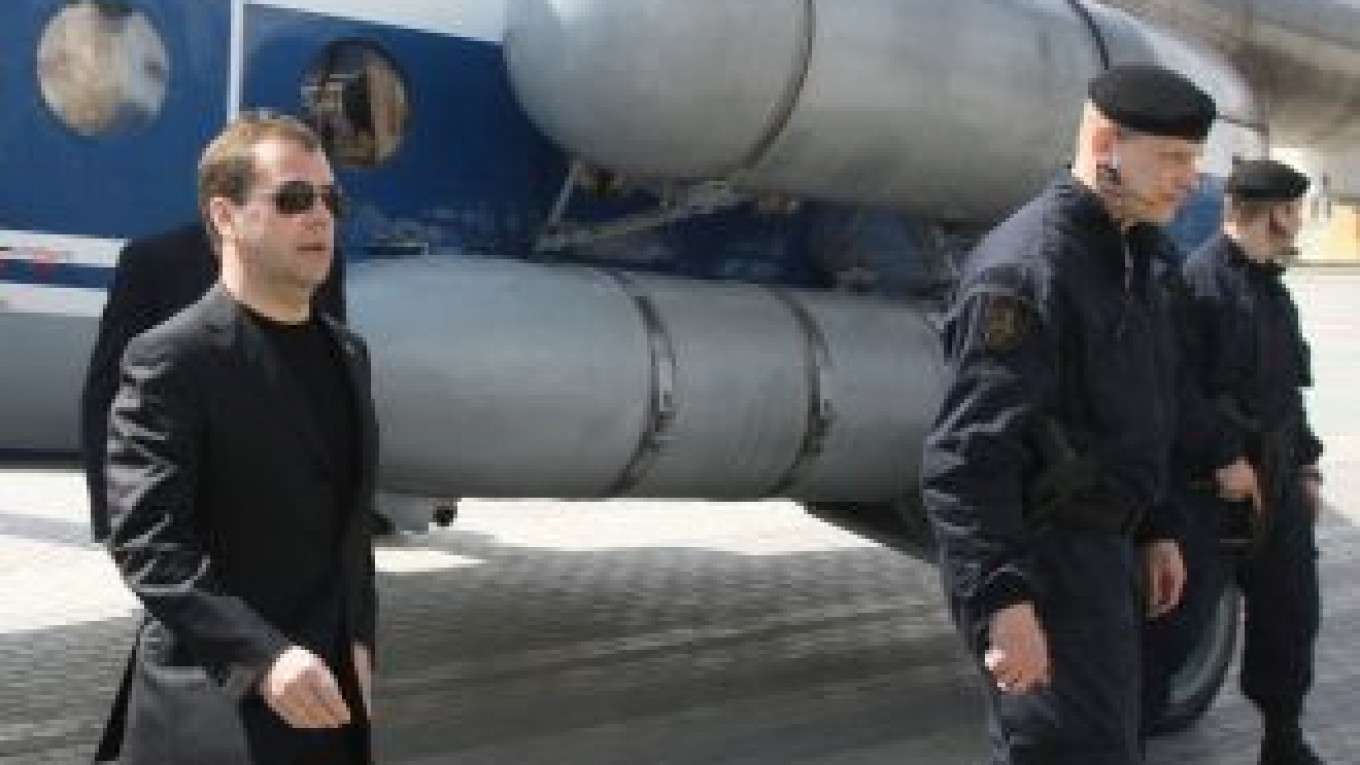President Dmitry Medvedev called on Thursday for the introduction of "brutal" measures against terrorists during a surprise visit to Dagestan, where a new car bombing killed two people.
The Federal Security Service announced that it had identified the organizers of two terrorist attacks that killed at least 49 people this week in Moscow and the Dagestani town of Kizlyar.
"We have twisted off the heads of the most odious bandits, but it looks like this is not enough," Medvedev told a meeting of leaders from the restive North Caucasus republics in Makhachkala.
"Perhaps the list of measures — and not only for our country, but in general — should be broadened to become not only more effective but also harsher and, if you wish, more brutal to prevent terrorist attacks," he said.
Medvedev seemed to be borrowing a page from his mentor, Prime Minister Vladimir Putin, in both words and wardrobe Thursday. Medvedev's sharp rhetoric echoed Putin's own tough talk — just Tuesday, Putin said terrorists should be "dredged from the bottom of the sewers" and sent to "the kingdom of God" —? and the president wore a black T-shirt and black suit jacket — Putin's trademark working-trip outfit.
Putin, however, rarely made snap visits to areas reeling from terrorist attacks during his presidency.
At least 10 people were killed in a double suicide bombing in Kizlyar on Wednesday, two days after two suicide bombers killed 39 in the Moscow metro. Two more people died in a car bombing in Khasavyurt, Dagestan, early Thursday.
Chechen rebel leader Doku Umarov on Wednesday claimed responsibility for the Moscow bombings, the first major terrorist attack in the city in six years.
Federal Security Service director Alexander Bortnikov, who accompanied Medvedev on the five-hour trip to Dagestan, said investigators knew who had organized the attacks and were hunting for them.
"Certain people have already been detained, and interrogations are being conducted," he said. "We've got material evidence that is being examined by experts."
He did not elaborate.
Medvedev said Wednesday that the Moscow and Kizlyar bombings were linked.
But two State Duma deputies from the North Caucasus cast doubt Thursday on Umarov's claim that he had personally ordered the metro bombings.
"Can we trust terrorists, the leaders of the criminal groups? I doubt it," said Akhmar Zavgayev, who represents Chechnya in the Duma, Interfax reported.
Gadzhimet Safaraliyev, who represents Dagestan, said Umarov was probably taking credit for bombings carried out by another group.
"He doesn't have a network of operatives powerful enough to organize and carry out the latest terrorist attacks in Moscow and Dagestan," Safaraliyev said. ?
Umarov, 45, is the leader of the so-called Caucasus Emirate, an umbrella group uniting Islamist rebels in Chechnya, Ingushetia and, to a lesser extent, Dagestan, Karachayevo-Cherkessia and Kabardino-Balkaria.
A convicted murderer, he joined the ranks of the Chechen rebels on the very onset of the first federal military campaign in Chechnya in 1994 and quickly rose in the ranks. An audacious and experienced guerilla fighter, Umarov became the formal leader of the Chechen rebels — the president of the separatist Chechen Republic of Ichkeria — in June 2006 after his predecessor, Abdulkhalim Saidulayev, was killed by federal special forces.
In 2007, Umarov created the Caucasus Emirate and urged supporters to fight in Russia and other places, including Afghanistan, Iraq, Somalia and the Palestinian territories.
The Supreme Court designated the Caucasus Emirate as a terrorist organization earlier this year.
Immediately after the Moscow bombings, some lawmakers speculated that the attackers had been trained by Said Buryatsky, a rebel ideologist who reportedly swore an oath of loyalty to Umarov in 2008. Shortly after Buryatsky joined the ranks of the rebels, a string of suicide attacks rocked cities in the North Caucasus.
Buryatsky was killed by FSB commandos on March 2. The FSB said at the time that about 30 suicide bombers trained by him remained at large.
Umarov did not name Buryatsky in a video released Wednesday on a rebel web site in which he claimed responsibility for the Moscow bombings.
FSB director Bortnikov promised on Thursday that his agency would bring the organizers of the terrorist attacks to justice "regardless of the price." He added that the FSB has killed 26 rebels this year, but 23 FSB officers also died in the fighting.
Medvedev, speaking at the meeting in Makhachkala, which was arranged by Alexander Khloponin, presidential envoy to the newly created North Caucasus Federal District, said a brutal crackdown on terrorists was not enough. He called on the leaders of the predominantly Muslim North Caucasus republics to support loyal religious leaders so as to fight religious extremism and terrorism.
He also urged journalists to be objective when reporting about terrorist attacks and to avoid portraying natives of the North Caucasus in a negative light.
"This is not a foreign province. This is our country. We need to use the correct terminology, and we should never insult people," Medvedev said.
A Message from The Moscow Times:
Dear readers,
We are facing unprecedented challenges. Russia's Prosecutor General's Office has designated The Moscow Times as an "undesirable" organization, criminalizing our work and putting our staff at risk of prosecution. This follows our earlier unjust labeling as a "foreign agent."
These actions are direct attempts to silence independent journalism in Russia. The authorities claim our work "discredits the decisions of the Russian leadership." We see things differently: we strive to provide accurate, unbiased reporting on Russia.
We, the journalists of The Moscow Times, refuse to be silenced. But to continue our work, we need your help.
Your support, no matter how small, makes a world of difference. If you can, please support us monthly starting from just $2. It's quick to set up, and every contribution makes a significant impact.
By supporting The Moscow Times, you're defending open, independent journalism in the face of repression. Thank you for standing with us.
Remind me later.


